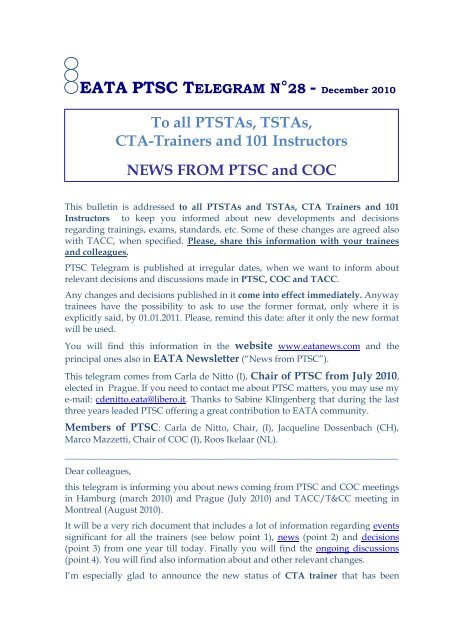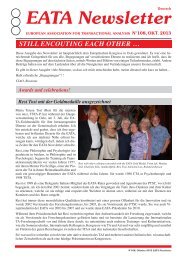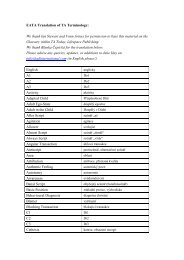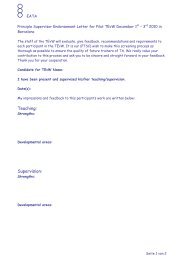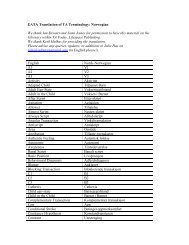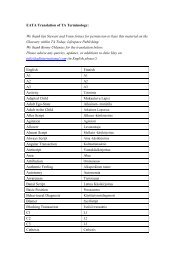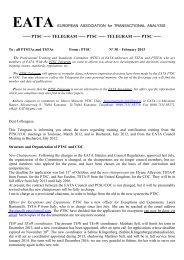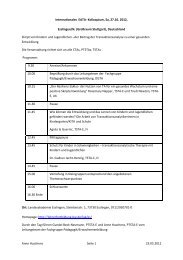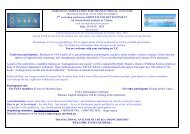PTSC TELEGRAM 28 February 2011 - European Association for ...
PTSC TELEGRAM 28 February 2011 - European Association for ...
PTSC TELEGRAM 28 February 2011 - European Association for ...
Create successful ePaper yourself
Turn your PDF publications into a flip-book with our unique Google optimized e-Paper software.
EATA <strong>PTSC</strong> <strong>TELEGRAM</strong> N°<strong>28</strong> - December 2010<br />
To all PTSTAs, TSTAs,<br />
CTA-Trainers and 101 Instructors<br />
NEWS FROM <strong>PTSC</strong> and COC<br />
This bulletin is addressed to all PTSTAs and TSTAs, CTA Trainers and 101<br />
Instructors to keep you in<strong>for</strong>med about new developments and decisions<br />
regarding trainings, exams, standards, etc. Some of these changes are agreed also<br />
with TACC, when specified. Please, share this in<strong>for</strong>mation with your trainees<br />
and colleagues.<br />
<strong>PTSC</strong> Telegram is published at irregular dates, when we want to in<strong>for</strong>m about<br />
relevant decisions and discussions made in <strong>PTSC</strong>, COC and TACC.<br />
Any changes and decisions published in it come into effect immediately. Anyway<br />
trainees have the possibility to ask to use the <strong>for</strong>mer <strong>for</strong>mat, only where it is<br />
explicitly said, by 01.01.<strong>2011</strong>. Please, remind this date: after it only the new <strong>for</strong>mat<br />
will be used.<br />
You will find this in<strong>for</strong>mation in the website www.eatanews.com and the<br />
principal ones also in EATA Newsletter (“News from <strong>PTSC</strong>”).<br />
This telegram comes from Carla de Nitto (I), Chair of <strong>PTSC</strong> from July 2010,<br />
elected in Prague. If you need to contact me about <strong>PTSC</strong> matters, you may use my<br />
e-mail: cdenitto.eata@libero.it. Thanks to Sabine Klingenberg that during the last<br />
three years leaded <strong>PTSC</strong> offering a great contribution to EATA community.<br />
Members of <strong>PTSC</strong>: Carla de Nitto, Chair, (I), Jacqueline Dossenbach (CH),<br />
Marco Mazzetti, Chair of COC (I), Roos Ikelaar (NL).<br />
_________________________________________________________________________<br />
Dear colleagues,<br />
this telegram is in<strong>for</strong>ming you about news coming from <strong>PTSC</strong> and COC meetings<br />
in Hamburg (march 2010) and Prague (July 2010) and TACC/T&CC meeting in<br />
Montreal (August 2010).<br />
It will be a very rich document that includes a lot of in<strong>for</strong>mation regarding events<br />
significant <strong>for</strong> all the trainers (see below point 1), news (point 2) and decisions<br />
(point 3) from one year till today. Finally you will find the ongoing discussions<br />
(point 4). You will find also in<strong>for</strong>mation about and other relevant changes.<br />
I’m especially glad to announce the new status of CTA trainer that has been
<strong>PTSC</strong> Telegram n° <strong>28</strong> 2<br />
approved by <strong>PTSC</strong>. It is an important chance to better articulate the accreditation<br />
processes, creating a status which mirrors the interest of focussing on training <strong>for</strong><br />
CTAs (see below point 2.1).<br />
In this number you will also find a detailed distinction between the two types of<br />
TEW (Training Endorsement Workshop) and the TEvW (Training Evaluation<br />
Workshop) (see below point 2.2). Thanks to Matthias Sell <strong>for</strong> his professionalism<br />
leading these processes.<br />
1. EVENTS<br />
On occasion of the World Conference in Bilbao, we are organizing the<br />
International Trainers Meeting, that will take place on July 5 th <strong>2011</strong>in Bilbao, from<br />
10:00 a.m. to 1.30.<br />
It will be a wonderful chance <strong>for</strong> the worldwide TA trainers to share their<br />
thinking on a relevant issue <strong>for</strong> this special time: “Professional Standards and<br />
Accreditations in TA worldwide: today perspectives”.<br />
All the trainers are invited to participate and share their reflections and to<br />
contribute to a wide view from different perspectives.<br />
Another significant event will be the next year in July, 2012 the International<br />
Trainers Meeting.<br />
National <strong>Association</strong>s are invited to propose themselves to host<br />
this important event.<br />
Please, send your proposal to Marianne Rauter (DGTA.GS@t-online.de). The<br />
bidding process will be published also via website.<br />
2. NEWS<br />
2.1. CTA Trainer: a new status of certification<br />
The CTA trainer is a new status that allows to provide TA training and<br />
supervision to prepare to the exams future CTAs; the Trainer fully takes<br />
responsibility toward his/her trainees and sign autonomously their CTA training<br />
contracts (without any endorsement by a TSTA).<br />
In addition, the new status of accreditation of trainers will focus on specific criteria<br />
to train future CTAs that are different from focus and criteria needed to train<br />
PTSTAs.<br />
This new status has been accredited considering the <strong>European</strong> situation <strong>for</strong> many<br />
PTSTAs, interested to train just future CTAs. The CTA trainer's status takes care of<br />
this kind of need.<br />
Carla de Nitto, Chair of <strong>PTSC</strong><br />
cdenitto.eata@libero.it
<strong>PTSC</strong> Telegram n° <strong>28</strong> 3<br />
The procedure to reach this kind of accreditation is described below (see below<br />
2.2.2.).<br />
A CTA trainer, whenever he/she wants, may decide to sign a new TSTA training<br />
contract to become TSTA.<br />
To become a CTA trainer the advanced PTSTA have to be evaluated participating<br />
to a TEvW (see below 2.2.3).<br />
The CTA trainer status at the moment is a special status recognised by EATA <strong>for</strong><br />
everyone with EATA contracts. A dialogue is open about it with the T&CC.<br />
2.2. TEW (old <strong>for</strong>mat), TEW (new <strong>for</strong>mat) and TEvW: differences and<br />
similarities<br />
Thanks to Matthias Sell that has strongly contributed to this section of the <strong>PTSC</strong><br />
Telegram, clarifying the specificity of each of the mentioned kind of training.<br />
You will find below a short description about it and in the next EATA Newsletter<br />
(inside the insert “News from <strong>PTSC</strong>”) a detailed description of the three paths,<br />
procedures, the commune spirit of them and whatever is linked to it.<br />
This clarification is aimed to help CTAs to choose their favourite path to continue<br />
their training in TA and PTSTAs to have detailed in<strong>for</strong>mation about how to<br />
become CTA trainer.<br />
A special attention is <strong>for</strong> all of you, P/TSTA, in order to have updated and clear<br />
in<strong>for</strong>mation <strong>for</strong> your trainees. Please, dear colleagues, in<strong>for</strong>m them about it.<br />
2.2.1. TEW (old <strong>for</strong>mat)<br />
It is the Training Endorsement Workshop that you will find in the Handbook,<br />
section 10. For a short scheme, look at fig. 1. Within one year after the<br />
endorsement in this kind of TEW, the CTA may sign a TSTA training contract,<br />
have an individual training and after that he/she reaches the needed<br />
requirements, take her/his exam as TSTA.<br />
2.2.2. TEW (New <strong>for</strong>mat)<br />
This Training Endorsement Workshop comprehends two different Workshops, the<br />
Training Preparation Workshop (TPW) + the Training Evaluation Workshop<br />
(TEW). The principal procedures (see fig. 1) are described below:<br />
<br />
<br />
Minimum one year after the CTA exam a candidate registers <strong>for</strong><br />
the first workshop, the TPW (this remains unchanged).<br />
TPW: the emphasis is on the preparation <strong>for</strong> teaching and training.<br />
It will be prepared according to the same criteria of the old <strong>for</strong>mat: the<br />
participant will show his/her teaching ability (Teaching), his/her<br />
Carla de Nitto, Chair of <strong>PTSC</strong><br />
cdenitto.eata@libero.it
<strong>PTSC</strong> Telegram n° <strong>28</strong> 4<br />
<br />
<br />
<br />
competence to supervise (Supervision) and his/her training planning<br />
(TPO). As a preparation <strong>for</strong> the future activity, the feedback of the stafftrainers<br />
focuses primarily on the process of teaching/supervision, with one<br />
specific point to address <strong>for</strong> the future preparation.<br />
Personal plan <strong>for</strong> the next three years of their training practice.<br />
TEW: Training Evaluation Workshop. After three years another workshop<br />
takes place, with the same staff of the previous one. At this time the stafftrainers<br />
would focus on both the process and the content of Teaching and<br />
Supervision.<br />
Within two years of individual time of preparation the participant may<br />
attend to a TEvW to become CTA trainer.<br />
TEW<br />
Training<br />
Endorsement<br />
WS<br />
old<br />
<strong>for</strong>mat<br />
1.Part<br />
Theory<br />
Organization<br />
Ethics<br />
2. Part<br />
3. Part<br />
Teaching<br />
Supervision<br />
TSTA<br />
Exam<br />
Within<br />
individual<br />
Ttime frame<br />
Within<br />
3 years<br />
Within<br />
2 years<br />
individual<br />
time<br />
frame<br />
TPW<br />
Training<br />
Preparation<br />
WS<br />
Staff<br />
TEW<br />
TPW<br />
Training Evaluation<br />
WS<br />
Staff<br />
TEvW<br />
Training<br />
Evaluation<br />
CTA Trainer<br />
WS<br />
Fig. 1: Different types of Training Workshop: TEW (old <strong>for</strong>mat), TPW/TEW (new <strong>for</strong>mat)<br />
and TEvW<br />
2.2.3. TEvW, Training Evaluation Workshop <strong>for</strong> CTA trainers<br />
It is a high level evaluation <strong>for</strong> advanced PTSTA who made a decision to become<br />
CTA Trainer. The purpose of the workshop is to evaluate on seven areas:<br />
(1)Teaching: management of the process and didactic of learning; (2) Supervision:<br />
structure of supervision and the philosophy of supervision in TA; (3) TRO, that<br />
means Training Report Outline, to write about the own experience, the highlights<br />
and the weak spots during the time being a PTSTA; (4) Ethics Awareness <strong>for</strong> ethic<br />
standards in TA and present this in case group discussions; (5) Exams being<br />
Carla de Nitto, Chair of <strong>PTSC</strong><br />
cdenitto.eata@libero.it
<strong>PTSC</strong> Telegram n° <strong>28</strong> 5<br />
involved with the organization, reporting about the own experience during exam<br />
processes; (6) Personal Style: getting feedback from colleagues, in terms of<br />
development the own identity being a TA-CTA-Trainer; (7) Personal planning a<br />
curriculum <strong>for</strong> TA-training and what should be organized differently.<br />
It is a wonderful experience of professional growth in group that takes advantage<br />
from the richness of the internationality of the experiences of candidates and staff<br />
members, all of them contributing to the growth of the TA community.<br />
The first two TEvW venues: the first TEvW took place with success in Budapest,<br />
on December 2009 while the second one in Barcelona, Spain, on December 2010.<br />
Both of them have been excellent experience of high competency. Matthias Sell, as<br />
TEW Coordinator, led both of them and has reported a great, intense and rich<br />
professional experience from candidates and staff members.<br />
Thanks to this experience EATA have accredited at the moment 9 (3+6) CTA<br />
trainers in the following fields: two in Education (1 from Germany and 1 from<br />
Switzerland), two in Counseling (from Germany) and five in Psychotherapy (1<br />
from Germany, 1 from France and 3 from Italy).<br />
Congratulations to all of them!<br />
During <strong>2011</strong> will take place the following Training Endorsement/Evaluation<br />
Workshops:<br />
<br />
<br />
<br />
<br />
TEW (“old” <strong>for</strong>mat): April 4 th -6 th , in Krakaw;<br />
TEW (“old” <strong>for</strong>mat): July, 2th-4 th , in Bilbao;<br />
TEvW: December 3 th -5 th in Lisboa (free place at the moment);<br />
TEW (new <strong>for</strong>mat), only <strong>for</strong> the participant of TPW in Turin (December<br />
2008): December 7 th -9 th in Lisboa.<br />
If you are interested, look <strong>for</strong> the Outline and Requirements in the website<br />
(www.eatanews.org) where you will fid conditions and deadlines. You may also<br />
contact Matthias Sell, TEW Coordinator (sell@mmt-sell.de).<br />
The first TEW in 2012 will be held in England (April 13th -15th ). You will find<br />
later further in<strong>for</strong>mation in the website <strong>for</strong> future events.<br />
2.3. Alessandra Pierini (I) is the new Supervising Examiner.<br />
A warm welcome to her and best wishes <strong>for</strong> her new task. A great thank you to<br />
Dave Spenceley <strong>for</strong> his generous and professional involvement in this task <strong>for</strong> six<br />
years.<br />
If you need to contact her, use the following email address: alessandrapierini@tiscali.it<br />
Carla de Nitto, Chair of <strong>PTSC</strong><br />
cdenitto.eata@libero.it
<strong>PTSC</strong> Telegram n° <strong>28</strong> 6<br />
2.4. New Language Coordinators <strong>for</strong> UK and “Other Countries”.<br />
Cathy McQuaid (UK) resigned from being Language Coordinator (LC) <strong>for</strong> the<br />
English language, UK and “Other countries”. Many thanks to Cathy. COC has<br />
decided to separate these two tasks. Barbara Clarkson (clarkson@talktalk.net ) is<br />
the new LC <strong>for</strong> UK while Marina Banic (mbanic@sbb.rs) is the LC <strong>for</strong> “Other<br />
Countries”. Thanks to both of them <strong>for</strong> their availability.<br />
2.5. COC has prepared a <strong>for</strong>mat with the administrative rules <strong>for</strong> the<br />
organisation of the examinations <strong>for</strong> CTAs and TSTAs.<br />
All these procedures are included in the appendix 1 in a document named<br />
“Contract <strong>for</strong> organising CTA and TSTA examinations between EATA COC and<br />
National <strong>Association</strong>s”. This contract is aimed to clarify general and<br />
administrative rules about the process of organizing the EATA examinations<br />
through a National <strong>Association</strong>.<br />
Please, use the <strong>for</strong>m of this “Contract” in the future, together with “Request <strong>for</strong><br />
EATA Subsidy <strong>for</strong> the organisation of COC exams” and the “Local Exam<br />
Supervisors Job Description”. Please, contact Marco Mazzetti, Chair of COC<br />
(marcomazzetti.at@libero.it ) <strong>for</strong> any further in<strong>for</strong>mation.<br />
2.6. TA training hours required <strong>for</strong> the CTA exam<br />
According to the new accredited status of CTA Trainer, the hours required <strong>for</strong><br />
CTA exam can be delivered not only by PTSTA or TSTA (Professional Practice<br />
Guidelines 3.2.2. E) but also by CTA Trainers.<br />
2.7. Advertisement<br />
This it is not new, but useful to remind taking into account recent<br />
misunderstandings: according to our Professional Practice Guidelines (3.2.2. G)<br />
members should be careful when they public their names in association with<br />
someone with different titles in order to not create misunderstanding about own<br />
category, e.g. CTA and (P)TSTA. Members in contract might check their<br />
advertising with the Principal Sponsor.<br />
3. DECISIONS<br />
As said be<strong>for</strong>e, any change and decision published in <strong>PTSC</strong> Telegram/T&CC<br />
Update come to effect immediately. When is possible to ask <strong>for</strong> the old <strong>for</strong>mat it<br />
is clearly said (3.1.3; 3.5.1). Anyway this possibility comes to an end on 01.01.2012.<br />
Carla de Nitto, Chair of <strong>PTSC</strong><br />
cdenitto.eata@libero.it
<strong>PTSC</strong> Telegram n° <strong>28</strong> 7<br />
3.1. CTA exams<br />
3.1.1. Certification of the words number of the written examination<br />
The candidate sending to the Language Coordinator his/her written examination<br />
has to send also a signed statement of the number of words in his/her written<br />
exam. The Language Coordinator can ask <strong>for</strong> an electronic version of the exam, if<br />
needed.<br />
3.1.2. Modified the examiners’ evaluation <strong>for</strong>m (12.7.15)<br />
It has been added, below to the name of the examinee, if he/she has passed or<br />
deferred (see appendix 2).<br />
3.1.3. Written exam questions <strong>for</strong> Theory in Organizational field (agreed also<br />
by T&CC, Montreal 2010).<br />
Modified the written exam questions <strong>for</strong> Theory in Organizational field (see below<br />
appendix 3). Thanks to Sabine Klingenberg and Anne de Graaf <strong>for</strong> their work.<br />
Important: the candidate may choose the old <strong>for</strong>mat by 01.01.2012. After this date<br />
he/she has to use only the new <strong>for</strong>mat.<br />
3.2. CTA training<br />
3.2.1. Percentage rule <strong>for</strong> CTA training in the field (agreed also by T&CC,<br />
Montreal 2010)<br />
Candidates have to have, as a minimum, 30% of the required professional training<br />
hours in TA (30% of 300=90) in the field in which the candidate wants to be<br />
examined.<br />
3.2.2. Anonymity of the candidate and possibility of feedback of the marker of<br />
the written exam at the end of exam process.<br />
When the written exam process is ended is possible to ask <strong>for</strong> feedback to the<br />
marker. There<strong>for</strong>e in the Handbook (<strong>for</strong>m 12.7.8.) after “[…] can be paid” we add:<br />
“and clearly state if you are available <strong>for</strong> a feedback with the candidate at the end<br />
of the exam process”.<br />
Carla de Nitto, Chair of <strong>PTSC</strong><br />
cdenitto.eata@libero.it
<strong>PTSC</strong> Telegram n° <strong>28</strong> 8<br />
3.3. TEW<br />
3.3.1. Change of the process of TPO<br />
The TPO has to be sent 8 month be<strong>for</strong>e to the staff member. He or she has to give<br />
feedback and decide to accept or not accept the TPO. If he or she does not accept<br />
it, it has to be sent back with the feedback. The candidate has to include the<br />
feedback, send the new version and the first feedback to the TEW coordinator. The<br />
TEW coordinator has to send both to a second marker. Then the second marker<br />
gave feedback. If the TPO is accepted, the candidate can participate in the<br />
TEW/TPW, if not the candidate has to write a new TPO.<br />
3.3.2. Requirement <strong>for</strong> the TEW<br />
A possible requirement of the TEW is to follow another TEW. The obtained<br />
endorsement of TPO is valid <strong>for</strong> a period of three years.<br />
3.3.3. Deadline to sign a TSTA training contract after the TEW endorsement<br />
The contract must be signed within one year otherwise the candidate has to<br />
participate in a new TEW/TPW.<br />
3.4. PTSTA Training<br />
3.4.1. 101 Instructor<br />
For the 101 instructor they have to follow the procedure according to the EATA<br />
Training and Examination Handbook 4.4.<br />
3.4.2. Length of TSTA contract<br />
If there is a second contract – this contract expires exactly 14 years after the first<br />
endorsement (even <strong>for</strong> the exceptional cases when there was a gap between the<br />
first and the second contract). Both TSTA and PTSTA are co-responsible to take care<br />
of the term of the contracts.<br />
3.4.3. Outline and Requirements of the next Training Evaluation Workshop<br />
You may find Outline and Requirements <strong>for</strong> the Training Evaluation Workshop<br />
<strong>for</strong> experienced PTSTA to become a CTA trainer in the website<br />
www.eatanews.org, with all in<strong>for</strong>mation you need.<br />
Carla de Nitto, Chair of <strong>PTSC</strong><br />
cdenitto.eata@libero.it
<strong>PTSC</strong> Telegram n° <strong>28</strong> 9<br />
3.5. TSTA Examination<br />
3.5.1. TA 101 Topics <strong>for</strong> TSTA Teaching exam (agreed also by T&CC, Montreal<br />
2010).<br />
Small changes have been made. You may find the new list in the appendix 4.<br />
Important: the candidate may choose the old <strong>for</strong>mat by 01.01.2012. After this date<br />
he/she have to use the new <strong>for</strong>mat.<br />
3.5.2. Tape TSTA exams as a mandatory<br />
We have introduced the mandatory to tape the TSTA exam, in each of its section.<br />
This will allow having the possibility to appeal in any circumstance. There<strong>for</strong>e in<br />
the Handbook (section 11.7.1) we will say: “Equipment to record the exam is<br />
mandatory as in absence of the recording the appeal can not be done“.<br />
3.5.3. Waiting list <strong>for</strong> TSTA Exams<br />
Most people are aware of the waiting list <strong>for</strong> TSTA exams and can take individual<br />
responsibility <strong>for</strong> checking the availability of places with the Supervising<br />
Examiner (SE). COC agreed on the following procedure: the Supervising Examiner<br />
keeps a list and, if there is a place available in the next exam site, she will give the<br />
place to persons on the waiting list. The SE will not accept anyone <strong>for</strong> a place if she<br />
or he has not completed all requirements when they apply.<br />
3.5.4. Change in TSTA Training contract (Handbook, 12.6.2)<br />
Small and significant changes are made to underline the commitment of the<br />
trainee; they are the following:<br />
<br />
<br />
<br />
B5: I have read and commit to follow the Code of Ethics and the Professional<br />
Practice Guidelines of EATA.<br />
B8: I have made an agreement with the undersigned trainer who will provide<br />
supervision and guidance in line with EATA requirements.<br />
(new) B.16: I have read and understand the EATA Training and Examinations<br />
Handbook plus any additional requirement related to my country. In fact it is the<br />
Training Manual<br />
Carla de Nitto, Chair of <strong>PTSC</strong><br />
cdenitto.eata@libero.it
<strong>PTSC</strong> Telegram n° <strong>28</strong> 10<br />
3.6. Rules <strong>for</strong> expansions<br />
3.6.1. Two clarifications have been made in the Handbook about expansions<br />
(section 6. part 2); you will read below (changes are underlined):<br />
<br />
<br />
(Introduction) Part 2:<br />
A description of the candidate’s professional experience as a trainer and/or<br />
supervisor in the expanded field, including, <strong>for</strong> example, personal experiences and<br />
details of giving workshops and/or lectures; supervising trainees and supervising<br />
projects. This will include details of extensive involvement in the training of at<br />
least two trainees, with a regular EATA or ITAA contract with the applicant”.<br />
Either a photocopy of two CTA certificates in the expanded field gained by<br />
trainees whose contracts he/she has held by Exception or a copy of the applicant’s<br />
Oral Exam Certification in the new field (in other words the applicant may choose<br />
to submit to the oral part of the CTA examination as evidence of his/her<br />
competence: in this case s/he needs a special permission from the <strong>PTSC</strong> to go to<br />
the exam)”.<br />
4. ONGOING DISCUSSION<br />
And finally, I wish to in<strong>for</strong>m you about some of the principal issues that we are<br />
planning to discuss in the future, looking at the new challenges in our TA<br />
community. On the behalf of <strong>PTSC</strong>, I would be glad to receive your ideas and<br />
feedback about:<br />
Minimum of 50 hours of personal development in TA (therapy, personal<br />
work): a requirement <strong>for</strong> all fields (instead of a recommendation)<br />
CPD <strong>for</strong> all Transactional Analysts<br />
Written exam and case studies – useful <strong>for</strong> research<br />
General requirement of a second marker <strong>for</strong> the written exam<br />
Next COC and <strong>PTSC</strong> meetings will take place in Bucharest on 4 th of March <strong>2011</strong>.<br />
Please make sure that your feedbacks arrive until 18 th of <strong>February</strong> <strong>2011</strong> at<br />
cdenitto.eata@libero.it<br />
Be<strong>for</strong>e ending this Telegram, I really wish to thank all trainers who are committed<br />
in developing the TA community.<br />
A special thanks to all the people that are so professionally working in the<br />
Committees (COC and <strong>PTSC</strong>) that contribute so much to all these reflections and<br />
changes. Thanks a lot also to all the people who make possible all process of<br />
certification in TA, all Language Coordinators and Exam Supervisors, to the<br />
Supervising Examiner, and to the TEW Coordinator. Thanks <strong>for</strong> your commitment<br />
and your voluntary work.<br />
I’m looking <strong>for</strong>ward meeting you in Bilbao at the International Trainers Meeting,<br />
Carla de Nitto, Chair of <strong>PTSC</strong><br />
cdenitto.eata@libero.it
<strong>PTSC</strong> Telegram n° <strong>28</strong> 11<br />
the World Conference, and the exams, to contribute together to the development<br />
of professionalism in TA.<br />
Warm regards<br />
Carla de Nitto<br />
Chair of <strong>PTSC</strong><br />
P.S. Three appendix are attached<br />
Carla de Nitto, Chair of <strong>PTSC</strong><br />
cdenitto.eata@libero.it
<strong>PTSC</strong> Telegram n° <strong>28</strong> 12<br />
Appendix 1<br />
EUROPEAN ASSOCIATION FOR TRANSACTIONAL ANALYSIS<br />
COMMISSION OF CERTIFICATION<br />
Contract <strong>for</strong> organizing CTA and TSTA examinations between<br />
EATA COC and National <strong>Association</strong>s<br />
The National <strong>Association</strong> applies to COC to organize examinations: This<br />
needs to be at least 18 months be<strong>for</strong>e the date of exams, and must be done<br />
by the President/Chair of the <strong>Association</strong>. COC will discuss and accept or<br />
reject the application at the first possible meeting or, if needed, by email.<br />
The National <strong>Association</strong> accepts to organize examinations following all<br />
the EATA rules<br />
The general rules <strong>for</strong> the exams are included in the EATA Handbook<br />
The specific administrative rules are included in the present contract and<br />
are accepted both by the National <strong>Association</strong> and COC. EATA pays <strong>for</strong><br />
all the practical arrangements (renting rooms, coffee/tea, refreshments and<br />
soft drinks during the exams, wine and flowers <strong>for</strong> the celebration, travel<br />
costs <strong>for</strong> the exam supervisors if needed, etc.) plus a dinner <strong>for</strong> all<br />
examiners and exam organizers in the evening following the examiners<br />
meetings.<br />
EATA has set a budget of €25 per examiner to fund the dinner, however if<br />
this is insufficient the National <strong>Association</strong> should liaise with the EATA<br />
COC and the EATA Treasurer. It is the responsibility of the National<br />
<strong>Association</strong> and of the exam supervisors to identify the right number of the<br />
participants to the dinner, with appropriate enquiries (i. e. asking all<br />
responders in the “call <strong>for</strong> examiners” <strong>for</strong>m).<br />
National <strong>Association</strong> will pay <strong>for</strong> all the costs and be reimbursed from<br />
EATA. After the exam the costs have to be verified by invoices, lists of<br />
examiners, etc.<br />
All the costs must be budgeted at least three months in advance, and<br />
approved by the COC and the treasurer.<br />
Appointment of local exam supervisors:<br />
1. Both a CTA and a TSTA exam supervisor need to be appointed.<br />
2. This is normally done by suggestion of the National <strong>Association</strong> in<br />
cooperation with the EATA COC who must agree the appointment.<br />
Regulations about exam supervisors on site have been <strong>for</strong>mally clarified:<br />
Carla de Nitto, Chair of <strong>PTSC</strong><br />
cdenitto.eata@libero.it
<strong>PTSC</strong> Telegram n° <strong>28</strong> 13<br />
1. If there are 15 or more CTA candidates there will be two exam<br />
supervisors<br />
2. If there are 5 or more TSTA candidates there will be an extra exam<br />
supervisor whose job will be to co-ordinate the volunteers<br />
(supervisees, audiences etc).<br />
3. The local TSTA exam supervisors normally appoint a volunteer to be<br />
responsible <strong>for</strong> taking care of the volunteer supervisees and<br />
audiences in the TSTA examinations: the “volunteer organiser”.<br />
4. The local exam supervisors (both CTA and TSTA) normally appoint<br />
volunteer(s) to help them in the practical organization of the exams<br />
As soon as the exam supervisors are appointed, they must liaise with the<br />
supervising examiner to in<strong>for</strong>m her/him they will take responsibility <strong>for</strong><br />
the exams.<br />
Carla de Nitto, Chair of <strong>PTSC</strong><br />
cdenitto.eata@libero.it
<strong>PTSC</strong> Telegram n. <strong>28</strong> 14<br />
Appendix 2<br />
COC<br />
EXAMINER EVALUATION FORM<br />
(Training and Exam Handbook - 12.7.15)<br />
Directions: Please rate each examiner and the chairperson of your exam board, using the rating<br />
scale shown in bold below, and return the completed <strong>for</strong>m to the supervisor of the examinations.<br />
Thank you <strong>for</strong> completing this <strong>for</strong>m. Your evaluation will help in the process of creating superior<br />
examination boards.<br />
RATING SCALE: The examiner’s skills in this area were perceived as<br />
5 – highly developed<br />
4 – good on the whole<br />
3 – satisfactory on the whole<br />
2 – unsatisfactory<br />
1 – poor<br />
Your name<br />
Place/date<br />
_______________________________________<br />
Passed<br />
Deferred<br />
_______________________________________<br />
Insert in each column the<br />
name of an examiner<br />
Chair of this board<br />
Exam Supervisor<br />
_______________________________________<br />
_______________________________________<br />
Questions were clear and precise<br />
RATING OF EXAMINERS:<br />
Questions were fair, relevant and appropriate <strong>for</strong> the knowledge and skills<br />
required by a CTA/TSTA<br />
The examiner offered the candidate the opportunity and the space to state<br />
his/her reasons and thinking and to defend his/her position<br />
The examiner offered clearly argued, fair, and relevant feedback<br />
The examiner made an ef<strong>for</strong>t to find the candidate’s strengths<br />
The examiner gave clear explanations <strong>for</strong> his/her ratings<br />
RATING OF BOARD CHAIRPERSON (in his/her role)<br />
The chairperson stayed in charge of the examination process and kept it moving along<br />
The chairperson structured the examination clearly<br />
The chairperson dealt with problems effectively as they came up<br />
The chairperson helped to create a com<strong>for</strong>table atmosphere, allowing the candidate to show his/her<br />
level of competence<br />
Carla de Nitto, Chair of <strong>PTSC</strong><br />
cdenitto.eata@libero.it
<strong>PTSC</strong> Telegram n. <strong>28</strong> 15<br />
Appendix 3<br />
Questions <strong>for</strong> organisational field CTA examination, section D<br />
1. Which concepts in transactional analysis literature do you use to describe an<br />
organization In your answer pay attention to the core dynamics and<br />
processes you observe in organizations as well as to organizational change.<br />
Elaborate on your selection.<br />
2. Which concepts in transactional analysis literature do you use to describe<br />
interpersonal relationships and communication within organizations<br />
3. How do you reflect on communication in organizations as manifestations of<br />
organizational processes<br />
4. Describe how you reflect on the relationship between people working in<br />
organizations and other aspects of organizational life, such as customers,<br />
technical process, finance, and legal issues. How is transactional analysis<br />
useful <strong>for</strong> you in this regard<br />
5. Describe the phenomena of repetitive behaviour in organizations and your<br />
use of concepts in transactional analysis literature in understanding them.<br />
Include in your answer the way you use those concepts to produce change<br />
or growth.<br />
6. Which TA - and other concepts do you use to<br />
<br />
<br />
Assess the current situation and the short and long-term necessities<br />
Design the direction of change and evaluate the outcomes of an<br />
organizational development or change process<br />
7. Describe a research project that you are involved in or know about. Discuss<br />
the implications <strong>for</strong> transactional analysis theory and/or practice.<br />
8. Describe concepts that you use to work with organizations from nontransactional<br />
analysis origin and how you relate them to concepts in<br />
transactional analysis literature.<br />
9. Which concepts in transactional analysis literature and non TA do you use<br />
to describe the phenomenon of organizational culture<br />
Carla de Nitto, Chair of <strong>PTSC</strong><br />
cdenitto.eata@libero.it
<strong>PTSC</strong> Telegram n. <strong>28</strong> 16<br />
Appendix 4<br />
TA 101 TOPICS FOR TSTA EXAM<br />
ERIC BERNE AND THE DEVELOPMENT<br />
OF HIS IDEAS<br />
DEFINITION OF TRANSACTIONAL<br />
ANALYSIS<br />
VALUE BASE OF TA<br />
AUTONOMY (DEFINITIONS OF)<br />
CONTRACTUAL METHOD<br />
AREAS OF APPLICATION –<br />
DIFFERENCES IN PROCESS<br />
DEVELOPMENT OF TA SINCE BERNE<br />
TA ORGANISATIONS WORLDWIDE<br />
STRUCTURE, STIMULUS AND<br />
RECOGNITION HUNGERS<br />
DEFINITION OF EGO STATES<br />
STRUCTURAL MODEL OF EGO STATES<br />
CONTAMINATION<br />
BEHAVIOURAL DESCRIPTION OF EGO<br />
STATES<br />
RECOGNITION AND DIAGNOSIS OF<br />
EGO STATES<br />
TRANSACTIONS AND TYPES OF<br />
TRANSACTIONS<br />
DEFINITION OF STROKES AND TYPES<br />
OF STROKES<br />
DEFINITIONS OF GAMES<br />
STROKE ECOMONY<br />
SOCIAL TIME STRUCTURING<br />
DEGREES OF GAMES<br />
REASONS FOR PLAYING GAMES<br />
WAYS OF DESCRIBING AND<br />
UNDERSTANDING GAMES<br />
DRAMA TRIANGLE<br />
DEFINITIONS OF RACKETS AND THEIR<br />
PAYOFFS<br />
DEFINITION OF SCRIPT<br />
RELATIONSHIP OF RACKETS, GAMES<br />
AND SCRIPT<br />
RACKET SYSTEM AND ANALYSIS<br />
LIFE POSITIONS – DEFINITION<br />
RELATIONSHIP OF LIFE POSITIONS TO<br />
GAMES AND SCRIPT<br />
ORIGIN OF SCRIPT IN CHILD’S<br />
EXPERIENCES<br />
PROCESS OF SCRIPT DEVELOPMENT<br />
CHANGING SCRIPT<br />
TA METHODOLOGY – GROUP AND<br />
INDIVIDUAL<br />
Carla de Nitto, Chair of <strong>PTSC</strong><br />
cdenitto.eata@libero.it


